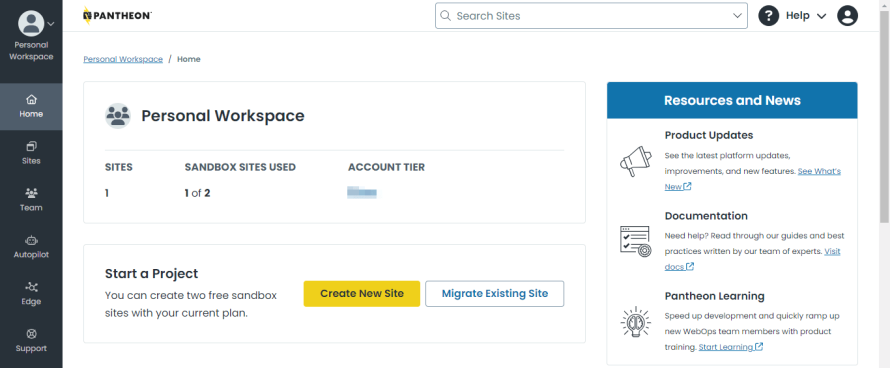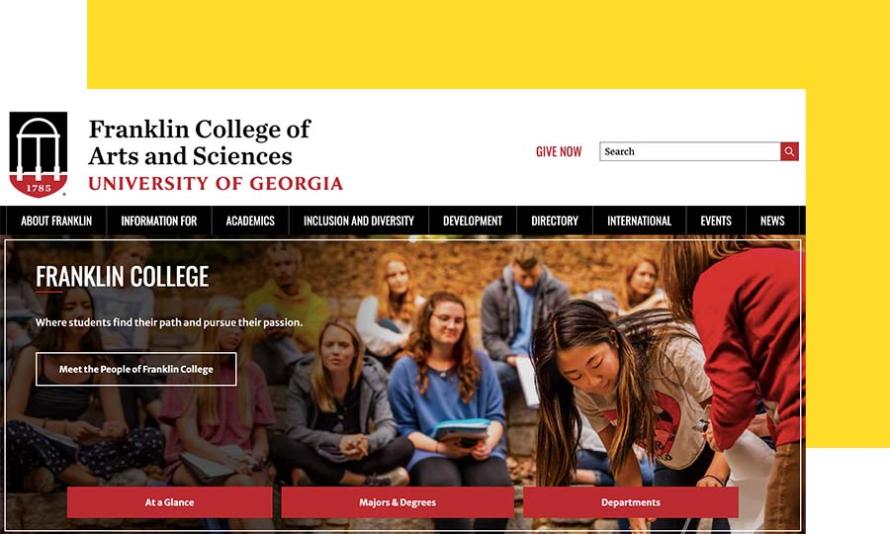Drupal's Role in Higher Ed Tech
Drupal powers many prominent higher education websites due to its enterprise-grade security and customization capabilities. It’s a highly trusted platform in higher education technology, with 71% of universities using it. That figure may be higher as research by The Drop Times discovered that 80% of the top 100 universities worldwide use Drupal for at least one of their websites. This shows there is no disputing its popularity as a content management system (CMS) in higher education.
Drupal's popularity stems from its focus on assisting ambitious developers and its ability to cater to the needs of educational institutions looking for flexible solutions for managing their sites. Its open-source nature adds to its appeal, and its emphasis on continuous improvement and collaboration resonates well with the academic principles of learning, researching and progressing together.
In this article, we’ll explore how Drupal is great in higher education and delve into the core features and philosophies that make it the CMS of choice for so many institutions.
Leading Universities Using Drupal
Image

Drupal is a leading content management system for higher education institutions due to its scalability, advanced features, open-source flexibility and strong security. Some of the world's most prestigious institutions continue to choose Drupal for their digital infrastructure, with many expanding their Drupal implementations even as the platform evolves. Examples include:
Harvard University uses Drupal for its digital presence. Through the HarvardSites Drupal platform, Harvard manages hundreds of department, school and research center websites, with most sites continuing to run on Drupal even as individual sites make platform decisions.
Stanford University relies on Drupal for scalable web operations. Stanford Sites, their free self-service platform built on the latest version of Drupal, allows unlimited website creation for departments, research groups and individual faculty across the institution.
Princeton University manages its web ecosystem with Drupal. The Princeton Site Builder platform provides centralized hosting, security and support at no cost to departments, demonstrating the university's long-term commitment to Drupal.
Yale University chose Drupal for its website infrastructure. YaleSites powers over 1,000 academic and administrative department websites, with Yale actively upgrading and expanding the platform's capabilities including recent AI integrations.
University of Oxford uses Drupal for its main and departmental sites. Through the Oxford Mosaic web content management platform – a Drupal-based system managed by IT Services – Oxford provides a streamlined solution for users with little web experience to build responsive, professional websites.
Why Is Drupal the Best Choice for Higher Education?
Higher education institutions face unique challenges in managing their digital presence but Drupal stands as the ideal solution tailored to meet these complex needs. Here’s how:
Flexibility and Customization
Drupal's core design is modular, allowing users to add and remove features by installing and uninstalling modules and themes. This modularity enables extensive customization without altering the core code. There are over 51,000 modules available in the official repository, which can enhance existing functionalities or add new ones entirely.
The Drupal EDU Accelerator provides preloaded functionality and content types specifically for academic institutions. This distribution offers universities a head start with pre-configured templates for common needs, while maintaining full customization capabilities.
Drupal allows creation of custom content types for faculty profiles. Universities can build detailed faculty directories with fields for research interests, publications, office hours and contact information – all searchable and filterable for students and colleagues. Course descriptions use structured content types for consistency. This ensures every course listing displays the same essential information: prerequisites, credits, learning objectives and enrollment requirements, making it easier for students to compare options.
Research papers and event listings have dedicated content structures. These specialized content types enable institutions to showcase academic work with proper citations and metadata, while event listings can automatically display dates, locations and registration links in a standardized format. This structured approach to content means information remains organized and accessible across thousands of pages.
The flexibility to create these custom content types without touching code is crucial for tailoring Drupal to unique higher education needs, whether building comprehensive course catalogs, managing complex academic calendars or maintaining departmental resources.
Drupal's Security
Educational institutions rely on Drupal's enterprise-grade security. With sensitive student records, financial data and research materials at stake, universities need robust protection that Drupal delivers through multiple layers of defense.
The platform protects sensitive student and faculty data. Built-in features include database encryption to prevent unauthorized access, security modules for two-factor authentication and automated security audits that identify potential vulnerabilities before they can be exploited.
Drupal has a dedicated security team that regularly identifies and addresses vulnerabilities. This team coordinates with the global developer community to ensure rapid response to emerging threats. Regular security updates defend against emerging threats. These updates are tested and released on a predictable schedule, allowing institutions to maintain security without disrupting operations.
Key security features include:
- Database encryption for protecting stored student records and personal information.
- Security modules like Password Policy and Two-Factor Authentication that enforce strong access controls.
- Role-based permissions ensuring users only access appropriate data.
- Security review tools that conduct automated audits and compliance checks.
The combination of proactive security measures, community vigilance and enterprise-level features makes Drupal a trusted choice for protecting educational data and maintaining regulatory compliance.
Check out our Drupal security best practices for more detailed insights into Drupal's security features.
Accessibility Compliant
Image

Ensuring accessibility for educational institutions is a legal requirement in the US. Drupal helps institutions meet legal standards for accessibility. The platform provides a comprehensive framework to achieve and maintain ADA compliance, addressing both technical and content accessibility needs.
The default theme, Olivero, is designed for Web Content Accessibility Guidelines (WCAG) compliance. This theme features clear focus states, high contrast modes and has been extensively tested by organizations including the National Federation for the Blind. It offers WCAG 2.1 AA compliance out of the box, providing an excellent foundation for accessible websites.
Built-in features create accessible and multilingual websites for global audiences. These features include:
- Semantic HTML5 and WAI-ARIA attributes that provide context to assistive technologies, enabling users with disabilities to navigate and understand content effectively.
- Adherence to WCAG 2.1 AA and ATAG 2.0 standards for both public-facing and author-facing interfaces, supporting the creation of accessible content by default.
- Keyboard navigation management through tools like TabbingManager, ensuring efficient navigation for users who cannot use a mouse.
- Accessible component architecture that maintains consistency across all website elements.
By building accessibility into its core rather than treating it as an add-on, Drupal enables universities to serve all students equitably while maintaining compliance with federal accessibility requirements.
Drupal's Multisite Functionality
Drupal's multi-site capabilities allow central IT teams to manage a single installation while giving individual departments control over their own content and branding. Universities can manage their entire web ecosystem, including main campus sites and departmental subsites, from a single Drupal installation. This means you update once and deploy everywhere. This saves a massive amount of time on maintenance, security patches and feature rollouts, while ensuring consistency across all properties. It's basically the difference between maintaining one house versus twenty separate houses.
Durpal's Integrations
Drupal’s open-source framework enables smooth integration with a wide range of third-party applications and systems essential to modern university operations:
- Drupal integrates seamlessly with Student Information Systems (SIS). This real-time synchronization ensures student records, enrollment data and academic information remain consistent across all campus platforms.
- Learning Management Systems like Moodle and Canvas connect through Drupal's API framework. Faculty and students benefit from unified access to course materials, assignments and campus resources through single sign-on functionality.
- Customer Relationship Management platforms sync with Drupal for admissions management. Recruitment teams can track prospective students from initial inquiry through enrollment, maintaining comprehensive communication histories and application statuses.
- Admissions portals like Slate integrate through standard APIs. This enables automatic data flow between application systems and the main website, reducing manual data entry and improving the applicant experience.
Connecting these disparate systems into a cohesive ecosystem allows universities to streamline their operations and workflows, significantly enhancing both operational efficiency and user experience across the entire institution.
Usability and Permissions
Drupal's robust system allows for the creation of unlimited roles with granular permissions. Each user has access only to the tools and information necessary for their role. For example, For example, faculty members can update course pages without seeing backend settings, while marketing staff can publish news stories using simple forms - making Drupal accessible for non-technical university staff to manage their specific content areas independently. This allows access that’s appropriate for an educational institution’s diverse users, from prospective students to faculty and alumni..
Features like the CKEditor allow for easy content creation and editing, helping make it even more accessible for teachers and administrators to update course materials, announcements and other content without needing extensive technical knowledge
Top tip: Website admins can fine-tune permissions to maintain security and operational integrity in an environment where multiple users interact with the system.
Community Support
With one of the most vibrant and active communities in the tech world, Drupal is continuously improving, ensuring that institutions benefit from the latest innovations and best practices in CMS technology. The collective expertise and collaborative spirit provide a solid foundation for any institution looking to enhance its digital strategy.
Taking it to the Next Level: Drupal on Pantheon
Having explored the various reasons why Drupal is a favored CMS for higher education institutions, it's clear that its capabilities are extensive. However, Drupal's full potential can be unlocked when paired with a powerful hosting and management platform like Pantheon. By partnering with Pantheon, universities can elevate their Drupal experience, ensuring their digital presence is secure, agile and highly effective.
Pantheon is designed to optimize Drupal's functionality, making it an ideal platform for higher education institutions that require reliability and scalability. Here’s how:
- Ease of Use: With our separate environments for Dev, Test and Live, updates can be applied easily and without disrupting the live site, ensuring that the digital experience delivered to students and faculty remains uninterrupted. This Multidev feature allows team members to fork the entire stack (code, database and files) and work in isolated environments.
Centralized Control and Efficient Collaboration: Pantheon’s dashboard offers a centralized control panel that simplifies the management of multiple Drupal sites. This is particularly advantageous for universities that operate several sites across different departments. Changes and updates can be reviewed and deployed without the typical bottlenecks in decentralized environments, fostering a more dynamic and responsive web management process.
Image

- Automated Backups: Pantheon provides automated backups with Autopilot. Its easy-to-use interface allows you to restore previous versions of your site, which is essential for maintaining data integrity and continuity. This proactive approach to backups ensures that recovery is swift even under any circumstances.
- Advanced Security: The platform's security measures are designed to thwart potential cyber threats and protect the university’s digital assets. This level of security is critical, especially considering the sensitive nature of the data handled by higher education institutions.
- Collaborative Workflow Systems: Pantheon also enhances Drupal's natural collaborative environment by providing a suite of tools designed for teams. These tools facilitate a smooth workflow for developers, content creators and site administrators, allowing everyone to work concurrently without stepping on each other’s toes.
Pantheon in Action: Franklin College
The Franklin College of Arts and Sciences, University of Georgia successfully modernized its web presence by partnering with Pantheon.
Image

The College's Web Services team consolidated 118 websites onto Drupal, implementing a standardized theme that maintains brand consistency while allowing for departmental customization. This move resolved longstanding issues with disparate systems, inconsistent branding and inefficient management.
“With Pantheon technology, we’ve created a well-governed, economy-of-scale web platform that allows us to centralize code and theme assets and provide security support for all our sites,” said Stephanie Lynn, Senior IT Manager at the Franklin College.
Pantheon's platform dramatically improved deployment speeds, reducing security updates from three days to just 90 minutes. The transition to Pantheon resulted in a 46% increase in monthly site traffic and a 31% improvement in page load speeds.
The streamlined process freed up resources, allowing the team to focus on new projects, including the ambitious digitization of the Georgia Museum of Natural History's vast collection of over seven million specimens.
We’ll make hundreds of thousands of items searchable, indexable and browsable in one massive collection by the time we’re done. This is what we’re able to focus on now that Drupal hosting and website maintenance is so much easier with Pantheon.”
- Stephanie Lynn, Senior IT Manager, Franklin College
Discover How Drupal Can Transform Your Institution's Digital Strategy
Higher ed institutions face challenges that must be mitigated – effectively managing multiple departmental websites, ensuring consistent high performance during peak application and enrollment periods, and maintaining stringent security and compliance standards. Each of these tasks requires a digital solution capable of adapting to the dynamic needs of an academic environment.
Drupal was designed to cater to the multifaceted demands of higher education institutions by offering flexible, secure and scalable solutions. Whether it's handling the surge of traffic during registration periods or integrating various academic and administrative functions, Drupal provides a solid foundation that adapts and grows with your institution.
Taking Drupal’s capabilities a step further, Pantheon enhances its features, making it even more appealing for higher education. With Pantheon, institutions can manage up to 1,000 sites from a single dashboard, ensuring streamlined operations across various departments. The platform guarantees high uptime, which is crucial during high-demand periods and adheres to the highest standards of security and compliance, safeguarding sensitive information against potential cyber threats.
Are you ready to see how Drupal, enhanced by Pantheon, can revolutionize your institution's digital strategy? Watch our free webinar to discover the benefits of Drupal for higher education in detail!
Frequently Asked Questions
1. Is Drupal a CMS or a platform?
Drupal functions as both a content management system and a digital experience platform. Beyond managing content, it serves as the foundation for complex digital ecosystems, integrating with student information systems, learning management platforms and third-party applications.
2. What technical expertise is needed to implement Drupal?
Drupal customization requires technical expertise or specialized agency partners. While basic content management is user-friendly, leveraging Drupal's full potential often means working with certified developers or agencies like those in Pantheon's partner network. Many universities maintain a hybrid approach with in-house teams for daily management and partners for complex development.
3. How can universities maintain consistency across departmental sites?
Clear content governance plans are essential to maintain brand consistency across departments. Successful institutions like Cambridge University establish light-touch governance models that balance standardization with departmental autonomy, ensuring door handles are in the same place while allowing creative expression.
4. What should universities consider when extending Drupal's functionality?
Institutions must evaluate modules carefully for security and compatibility. With over 51,000 modules available, universities should vet additions through security reviews, check community support levels and test compatibility with existing systems before deployment.